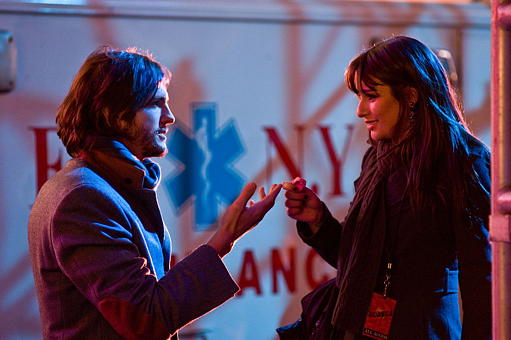By Pam Glazier · December 12, 2011

Sometimes you want something trite, something pre-packaged. There’s comfort in the predictable. I’ve heard it said that this is the explanation for the long duration of hated TV shows. They’re not the best, but they’re far from the worst, and sometimes you want something trite. With all the crap floating around in the world, it’s nice to get a chance to turn your brain off for a while and smile mindlessly at something fluffy. That being said, getting the formula right for this particular style can be pretty difficult. Did you see Larry Crown? That’s my point. New Year’s Eve attempts to be this kind of film.
So how do you get this type of story right? First of all, you have to give your characters a strong reason to want something, and you have to make it hard for them to get it. Secondly, and this is the hard part, you have to sell your audience. The main characters have to be people the audience empathizes with. The audience has to think that her or his wants are important. And the conflict has to seem realistic to the situation. If you’ve written anything, then you’ve heard this all before, but that’s because these are the bare necessities. You’ve got to ask yourself, “Who cares?” and then you have to ask yourself “why?” That’s the bottom line no matter what kind of story you think you’re telling.
So, did New Year’s Eve pass the test? Well, not really, but it has its moments. Just like his earlier film Valentine’s Day, Gary Marshall directs an ensemble cast in order to explore what happens to randomly connected people around a particular time and place. It’s as if the Hallmark channel decided to do an Altman picture. But sadly, only one of the story lines had characters that were worth caring about. This is the storyline where Paul (Zac Efron), the goofy messenger who only wants to party, meets Ingrid (Michelle Pfeiffer), the frazzled and unappreciated older executive secretary who gave up everything in order to succeed in the job that she hates. It just so happens that Ingrid has tickets to the most exclusive party in New York because she works for some fancy music company. And it also just so happens that she can’t stand her shitty life anymore. She quits her job and bribes Paul. If he can help her cross off all of the resolutions on her bucket-list, he gets the tickets. Doesn’t that sound adorable? Well it was. Efron and Pfieffer are great together, and the story line is extremely cute. And as a side note, Jonathan Lithgow has a great cameo as Ingrid’s boss.
But that is only 1/8 of the film. There are seven other story lines. And even though most of them are decent ideas, they are just a series of events that don’t really matter because the basic principles were ignored. Sure there are cute moments, but nothing really means anything. The characters and the conflicts are boring or unbelievable.
I’ll give you a quick run-through so you see what I’m talking about:
I think I read in a screenwriting book somewhere that this is called “parallel narrative structure”. Usually using story parallels leads to a big revelation or cathartic moment at the end where all the stories tie together and end up revealing a bigger message. I think they were trying to do that with this film, but unfortunately it fizzled.
All of these story lines seem like appropriate ways to explore second chances and fighting for love—well, except for the chef/rock-star story line. But the depth required to really feel for the characters was lacking. This is harmless in small doses, but it adds up. And it also leads to mistakes. For example, the story line with Sam the playboy (Josh Duhamel) and lonely woman Claire (Hilary Swank) meeting a year later at midnight was almost good until it derailed. Instead, Sam ends up meeting Kim, the over-protective mom (Sarah Jessica Parker) at midnight. And Claire ended up meeting her dying father Stan (Robert De Niro) to see the ball drop one last time. This twist came from out of nowhere and was extremely unsatisfying because it felt like a lot of great tension was created between Sam and Claire in their desperate yearning for their mystery dates, and then it was ripped away in the end. There was no set-up to Sam and Kim. Kim wasn’t yearning. She was chasing her daughter all over Manhattan. This abrupt switch sours the audience even though Sam, Claire, Kim, and Stan all got what they wanted.
Gary Marshall gets great heartwarming performances from the talented actors in his cast. If you like ensemble rom-coms and have ten dollars to burn, go ahead and catch this movie. It does have its moments. Perhaps you will like it… despite its flaws.